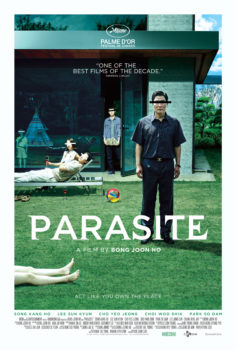 At the recent 26th Annual Screen Actors Guild Awards, 2020, Boon Joon-Ho’s dark comedy and social thriller made history as the first foreign language film to win Best Cast in a Motion Picture, the ceremony’s most prestigious award.
At the recent 26th Annual Screen Actors Guild Awards, 2020, Boon Joon-Ho’s dark comedy and social thriller made history as the first foreign language film to win Best Cast in a Motion Picture, the ceremony’s most prestigious award.
“Parasite” also won Best Foreign Film, and was nominated for Best Director and Best Screenplay at the 2020 Golden Globe awards. This could possibly be the first South Korean film to win an Oscar for Best Picture, depending on how the event goes on Feb. 9.
The movie is a mix of humor and drama, following the Kim family’s struggle with poverty — and their attempts to rise out of it — by conning the wealthy Park family. Park So-Dam, the actor playing Kim Ki-Jung in the movie, said at the SAG awards, “It depicts a class struggle taking place, all under one roof, where some aren’t even aware a struggle exists.” It is a timely look at the problems South Korea is facing, and the movie treats them with honesty and respect, while making it entertaining for an audience.
The divide of wealth is a big problem in South Korea, and Parasite does a good job showing what that looks like, and how it affects the people living in poverty. The opening scene shows the Kim family trying to find an open WIFI connection in their basement of a home just so the mom, Kim Chung-Sook, can look for work. It is a well-crafted scene that sets the tone for the movie.
It is humorous, and the audience laughs at their struggle, but maybe that also says something about the audience that is watching. The comedy is often undercut with a serious tone which keeps the conflict grounded and correlates with the subject matter the story is tackling. For example, the Kim family and another poor family are willing to fight each other to earn the right to be in favor of the rich, instead of coming together to find a solution to their problems.
There is much that should be left unsaid, as it is best to go into this movie with as few spoilers as possible —even minor ones.
The turns that the movie takes hit hard because you don’t expect them, especially after the “dark” parts of “dark comedy” start to come into play.
It is a movie with three very distinct acts, but they blend so well together, that it doesn’t feel disjointed. Each act ramps up the stakes, and starts to lean more and more into the movie’s “R” rating.
The settings, including both the Kim home and the Park house, are memorable and have some impressive imagery that sticks in the viewer’s mind. While the cinematography doesn’t break the mold, it does use established techniques well; and when combined with the memorable settings and some striking imagery, it is a treat for the eyes.
The main reason why all the comedy— as well as the drama— work so well, is that the main cast is very likeable.
Having watched the movie, it is easy to see why it won Best Cast at the SAG awards. The Kim family has such great chemistry; and their attempt to make the best of a bad situation make you want to root for them, even when they aren’t always making what would be the “right” choices.
Even the rich Park family, who could have been villains, are equally as likeable as they just want what they believe is best for their kids. Consequently, they are willing to believe the Kim’s promises that they are the best candidates to help them. They are gullible in an endearing way, but are also portrayed as being uncaring of other people.
It is a movie about characters making intelligent mistakes, actions that are seen as wrong, but we understand why they are making them, and can empathize with them.
When talking about character loyalties at the SAG awards, Kim Chung-Sook’s actress, Jang Hye-Jin, said audiences would be, “Questioning who, exactly, are the heroes and who are the villains.” This is a dilemma that will stay with the viewer long after the credits stop rolling.





Comments